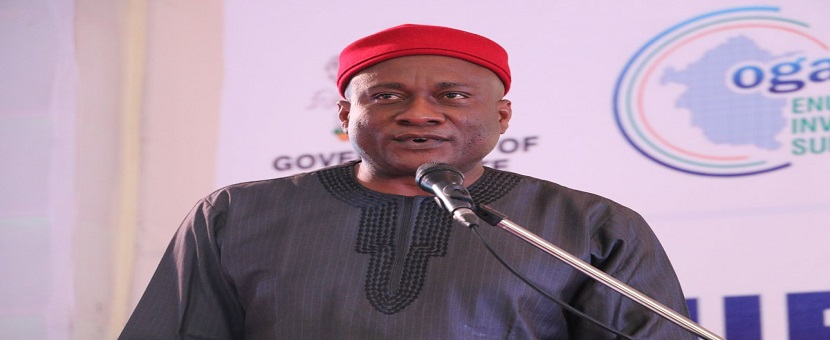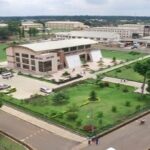One of the greatest treasures of life is a good name, hence the saying, “A good name is greater than gold.” Proverbs 22:1. It takes ages to build a good name and reputation. However, just like every other thing, it is a lot easier to destroy than to build. A man with a good name is naturally a lover of peace as no man who sues for violence would ever be regarded as a good man. Again, the Holy Book contains the saying that “Blessed are the peacemakers, for they will be called children of God.” Matthew 5:9.
The Man, Onyema, and his profile of peace.
Over the years, the man, Allen Ifechukwu Onyema Esq., has earned a profile of a good man and lover of peace. His brief profile* as would be highlighted below accounts for the reason we described him herein as the “CEO of Peace”.
- Onyema is a Nigerian citizen, born in Benin City, Edo State, in 1964 to parents of Anambra State Origin.
- He is a lawyer.
- He attended the University of Ibadan. While as a student, his love for peace was said to have made him to lead a group of 9 other students to travel to Zaria to help end the religious and ethnic riot that claimed lives. The aftermath of this was the formation of a group known then as Eminent Friends’ Group – a group formed with the main objective of promoting ethnic harmony amongst Nigerians of diverse ethnic nationalities and fighting violence of all forms in Nigeria.
- He is the founder and Chairman of several organisations that promote peace across Nigeria, including the Foundation for Ethnic Harmony, International Center for Non-Violence and Peace Development, and All-Time Peace Media Communications Limited.
- In April 2007, he was confirmed appointed into the Executive Board of The Global Nonviolence Conference Series Inc. USA.
- Onyema initiated, organised and held the “1st Nigeria Forever Project” in 2005 with the support of the Federal Government of Nigeria – a project geared towards the promotion of broad nationalism as against ethnic nationalism.
- In 2013, he founded an airline and named it Air Peace – The name further demonstrates his love for peace.
- In September, 2019, Mr. Onyema offered free flights to evacuate Nigerians who wished to return home on account of the xenophobic attacks in South Africa.**
The Challenge
Now, coming at the heel of this admirable show of unprecedented kind gestures is the trending indictment of Mr. Onyema by the United States of America. Mr. Onyema and Mr. Ejiroghene Eghagha (Air Peace’s Chief of Administration and Finance) were accused of moving more than $20 Million from Nigeria through United States bank accounts in a scheme involving false documents based on the purchase of airplanes.
The Indictment is contained in a report*** made available on Friday, 22 November, 2019 by the United States Department of Justice (US DoJ) and accompanied by a 36-page Charge exclusively made available by PremiumTimes. The Charge was filed at the United States District Court, Northern District of Georgia, Atlanta Division against Mr. Onyema and Mr. Eghagha. The summary of the Indictment by the Grand Jury is as follows:
- Conspiracy to commit bank fraud;
- Bank fraud;
- Conspiracy to commit credit application fraud;
- Credit application fraud;
- Money laundering; and
- Aggravated identity theft.
Mr. Onyema and Mr. Eghagha were indicted on one count of conspiracy to commit bank fraud, three counts of bank fraud, one count of conspiracy to commit credit application fraud, and three counts of credit application fraud. Additionally, Mr. Onyema was charged with 27 counts of money laundering, and Eghagha was charged with one count of aggravated identity theft.
The Grand Jury
The trending indictment was the product of the Grand Jury. The role of the Grand Jury in the US criminal justice system is simply to examine a case tabled against an accused person by the prosecuting authority and determine if there is sufficient evidence on the face of the charges to support the case against the person. The Grand Jury at this stage does not determine the guilt or innocence of the person accused of an offence. If the Grand Jury finds that there is a case, it makes an indictment (in the form of a charge). It is on this basis that criminal prosecution may subsequently be carried out for the trial of the accused person. The accused person and his/her lawyer are not given an opportunity to be heard before the Grand Jury. (S)he will surely have his/her day in Court once trial begins. The Grand Jury**** is said to be “a kind of buffer or referee between the Government and the people.” United States v. Williams, 504 U.S. 36, 37 (1992).
Meaning of the offences
- Bank fraud – this generally involves all manner of fraudulent activities carried out (or attempted) against a financial institution or customers of the financial institution. It is different from typical bank robbery in that it does not involve direct physical attack and violence on the bank. See Title 18 of the US Code, Section 1344 – (18 U.S.C. § 1344); Shaw v. United States, 580 U.S. __, 137 S.Ct. 462 (2016); Loughrin v. United States, 573 U.S. __, 134 S. Ct. 2384 (2014).
- Money laundering – This has been described as “The illegal process of concealing the origins of money obtained illegally by passing it through a complex sequence of banking transfers or commercial transactions. The overall scheme of this process returns the money to the launderer in an obscure and indirect way.”***** Put rather simply, where one or more persons make a huge amount of money through an illegal activity, the usual problem is how to keep or utilize the ill-gotten wealth without being suspected by law enforcement agents. Therefore, in order to deal with this problem, the criminals involved would come up with different strategies (sometimes complex) to enable them use the money safely without raising suspicions – strategies that will make “dirty money” look clean. The entire process of implementing the said strategies and techniques is what is known as money laundering. During the process, the illegal funds might travel through many accounts and business fronts and thereafter return ultimately to the criminal, called the “launderer”. 18 U.S.C. § 1956 and 18 U.S.C. § 1957.
- Conspiracy – the conspiracy to commit any offence is in itself an offence because the law punishes the agreement to commit a crime. This is what criminal conspiracy is all about. 18 U.S.C. § 1349 criminalises conspiracy to commit bank fraud.
- Credit application fraud – “Credit application fraud occurs when an attacker uses stolen personally identifiable information, to apply for a credit card, loan, or other type of credit. They may even exploit the financial system to create a synthetic identity, i.e., a fictitious person, which is even harder for financial institutions to detect. Other terms for credit application fraud: synthetic identities; identity theft; new account fraud; credit card origination fraud.”****** 18 U.S. Code § 1014.
- Aggravated identity theft – This has been simply described as “when someone knowingly transfers, possesses, or uses without permission, identification of another person, and then uses that identification during and/or in relation to the act of a particular felony violation. Aggravated identity theft is different than identity theft because aggravated identity theft involves stealing another person’s identity and then committing a crime.”******* 18 U.S.C. § 1028A(a)(1).
Presumption of innocence and the irony
Interestingly, the US DoJ confirmed the presumption of innocence which is at the heart of the criminal justice system when it stated that:
“Members of the public are reminded that the indictment only contains charges. The defendants are presumed innocent of the charges and it will be the government’s burden to prove the defendant’s guilt beyond a reasonable doubt at trial.”
In effect, Mr. Onyema and Mr. Eghagha remain innocent until found guilty by a court of competent jurisdiction.
Although the presumption of innocence appear to be recognised, comments accredited to some of the US legal forces like Robert J. Murphy (Special Agent), Byung J. “BJay” Pak (U.S. Attorney) and Thomas J. Holloman (IRS-Criminal Investigation Special Agent in Charge of the Atlanta Field Office) leaves much to be desired – Reading their seemingly triumphant comments, one would think that a court of competent jurisdiction had found Mr. Onyema and Mr. Eghagha guilty already. This must be strictly condemned.
Is the Indictment overreaching?
According to the report by the US DoJ, the Charge was said to have been filed in order to protect the integrity of the US banking system from being compromised.
The genuineness of this recent move has however been reasonably questioned on many grounds by Emmanuel N. Emenyonu******** –
- No where did the Indictment actually convey how the Defendants harmed US depositors and their funds.
- No victims were specifically mentioned in the Charge not to talk of the monetary amount of the losses incurred by the victims.
- The US companies that sold airplanes and the banks that profited from facilitating those transactions have not asked to disgorge the profits arising from those transactions.
- If as alleged, Air Peace and the leaders of the company engaged in serial AML offenses using Wells Fargo, why is Wells Fargo Bank not included in the Indictment or in any separate indictment for that matter for Counts Nine to Thirty-Five?
Emenyeonu concludes that the Indictment appears to be overreaching.
While the above questions validly and thoroughly call into question the true motive behind the Indictment, one thing that is clear is that the law does not concern itself so much with the intentions of a prosecuting authority. The central focus is whether or not a crime has been committed. This is notwithstanding the fact that a prosecutor is enjoined to seek justice and not be a persecutor – Conviction need not be secured at all cost. One of the US criminal justice standards********* for the prosecution is that “The primary duty of the prosecutor is to seek justice within the bounds of the law, not merely to convict.”
Now, regarding the offences contained in the Charge, US depositors, their funds and the financial institutions need not be harmed (in terms of actual financial loss to the bank) before a person can be criminally liable. See Shaw v. United States (supra). It is also not a defence for one defendant to demand to be excused because other persons equally criminally liable have not been charged. Under the US Federal Criminal Justice system, the prosecutor is said to have “wide latitude in determining when, whom, how, and even whether to prosecute for apparent violations of Federal Criminal Law”, and this has been judicially recognized.**********
The Indictment by the Grand Jury is not conviction. The Defendants will be given opportunity to defend the charges. There is currently no proof that the mentioned Banks are not being interrogated and that if found wanting, will not be accordingly charged or sanctioned.
Expectedly, Mr. Onyema has unequivocally denied all the allegations.*********** The best denial will be taking the required steps at the appropriate time to defend himself and have the charges quashed. (We look forward to this).
American law recognises filing an action to seek remedy for malicious prosecution. Thus, if the charges are found to be frivolous at the end of the day, Mr. Onyema and Mr. Eghagha reserve the right to seek relief for malicious prosecution (based on fabricated evidence) and attack on their pedigree. The US Fourth Amendment allows for malicious-prosecution claims.************ Under Georgia Law, a criminal prosecution that is pursued maliciously and without probable cause can create a civil cause of action.*************
*****Money laundering
******Credit application fraud
*******Aggravated identity theft
********Emenyeonu
*********Criminal justice standards
**********Prosecutor’s discretion
***********Onyema denies
************Fourth Amendment
*************Georgia Law














